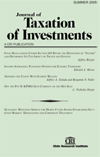Financial and Tax Arbitrage in the Commercial Paper Market
Author: Ari J. Brandes.
Source: Volume 27, Number 02, Winter 2010 , pp.3-20(18)

next article > |return to table of contents
Abstract:
This article describes the U.S. federal income tax regime covering short-term debt instruments held by cash method taxpayers. For short-term debt issued at a discount, cash method taxpayers are not taxed on the original issue discount (OID) until the instrument matures. For short-term, coupon-bearing debt, cash method taxpayers are not taxed until interest is actually or constructively received. Hence, cash method taxpayers should prefer, ceteris paribus , short-term debt maturing on January 1, Year 2, to debt maturing December 31, Year 1, where Year 2 is the year directly following Year 1. This sort of (notably non-controversial) “cross-border” tax arbitrage—where the border is the turn of the year, the demarcation of two tax periods—coupled with the well documented pre-tax overpricing of commercial paper risk around the turn of the year (resulting in higher than expected yields for paper maturing January 1 rather than December 31) provides an enticing investment opportunity to pick up basis points for certain cash method taxpayers.Keywords:
Affiliations:
.